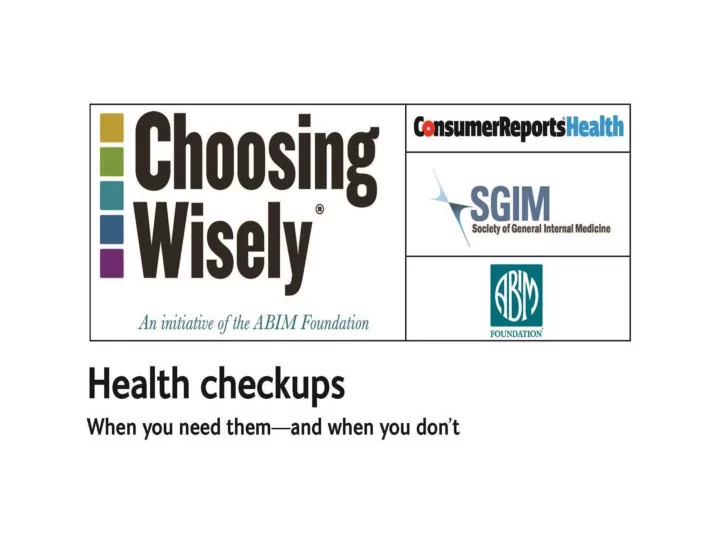

Purpose of Session • Clarify intent of the Choosing Wisely recommendation against routine annual check-ups for asymptomatic adults • Discuss concerns about the recommendation • Promote constructive discussion about how to improve communication about how often primary care clinicians should see healthy patients
Ground Rules • Listen • Be respectful • Be constructive • Remember core values we share
How did SGIM get involved? Joined 3 rd wave of participants • Agreed to principles of engagement • – Free to determine process – Make documentation of process publicly available upon request – Stay within specialty’s purview – Focus on 5 services used frequently or having significant cost – Cite supporting evidence – Review & update annually Agreed to prescribed format • – Single sentence < 16 words – Supporting evidence < 75 words – List resources used as evidence – Avoid complex or clinical terminology
How was list developed? • Council asked Larry McMahon to lead a work group drawn from Clinical Practice Committee & Evidence-Based Medicine Task Force • Council reviewed the recommendations & unanimously supported them
1. Don’t recommend daily home finger glucose testing in patients with Type 2 diabetes mellitus not using insulin. 2. Don't place, or leave in place, peripherally inserted central catheters for patient or provider convenience. 3. Don’t perform routine pre-operative testing before low-risk surgical procedures. 4. Don’t recommend cancer screening in adults with life expectancy of less than 10 years. 5. Don’t perform routine general health checks for asymptomatic adults.
Supporting Statement Routine general health checks are office visits between a health • professional and a patient exclusively for preventive counseling and screening tests. In contrast to office visits for acute illness, specific evidence-based preventive strategies, or chronic care management such as treatment of high blood pressure, regularly scheduled general health checks without a specific cause including the “health maintenance” annual visit, have not shown to be effective in reducing morbidity, mortality or hospitalization, while creating a potential for harm from unnecessary testing.
How disseminated? • Single sentence & supporting paragraph posted on www.choosingwisely.org • Press release on 9/12/13 • NEJM article on 2/13/14 • 2-pg flyer by Consumer Reports 3/14 – Requested edits re: regular dr, preventive care, sx/worry, trust • SGIM Forum & blog • Longer explanation posted on www.sgim.org
Recommend
More recommend